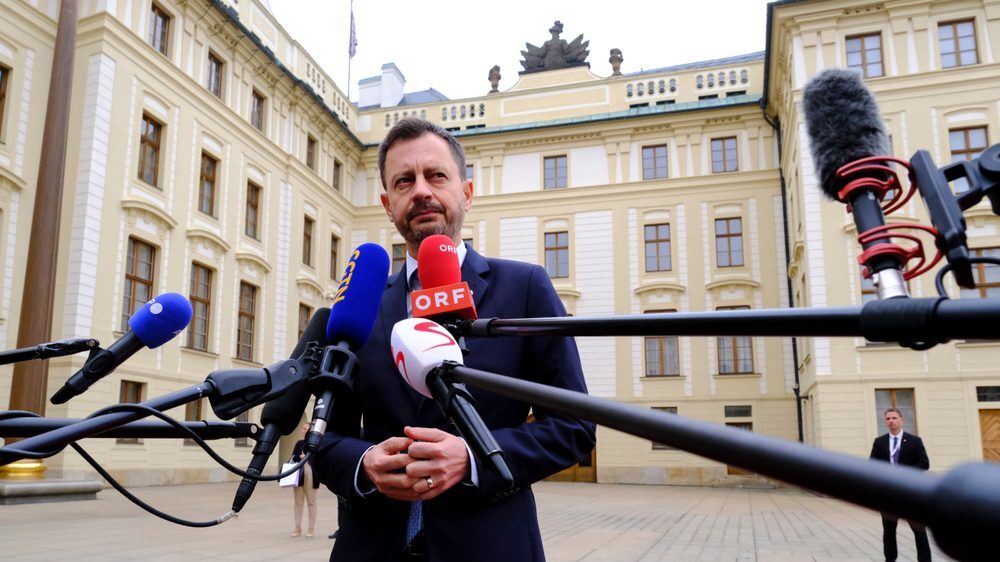
Outgoing (Acting) Prime Minister Eduard Heger, who resigned a month after switching political parties from the center-right to the center-left.
Alexandros Michailidis / Shutterstock.com
Following Slovakian Prime Minister Eduard Heger’s resignation on Sunday, May 7th, central bank Vice President Ľudovít Ódor was appointed to lead a technocratic government—a cabinet made up of experts not officially affiliated with any political party—from May 15th until the next general elections in September.
The Slovak political crisis has been ongoing for months as the country is divided over economic questions and the war in Ukraine, with a significant portion of the country demanding less financial and military aid for Ukraine, hoping to curb rising inflation.
Amid all this uncertainty, the country is bracing for general elections in September, after the previous government coalition, led by Eduard Heger, fell apart and suffered a no-confidence vote late last year, leaving Heger in a mere caretaker position.
Now, with his departure—preceded by the resignation of several others in the cabinet a few days prior, including the foreign and agricultural ministers—President Zuzana Čaputová appointed Ľudovít Ódor, Vice-President of the Slovakian National Bank since 2018, to lead the technocratic provisional government until the election.
“I consider it important for a smooth ending and transfer of agendas between governments,” Čaputová explained her choice in her public address.
🇸🇰#Slovakia:
— World Elects (@ElectsWorld) May 7, 2023
President Zuzana Caputova choosed Central Bank Deputy Governor Ľudovít Ódor to lead a technocratic Government.
This comes after the resignation of Prime Minister Eduard Heger (Democrats). pic.twitter.com/nT4KHEUrza
Ľudovít Ódor (born Lajos Ódor, a member of the Hungarian minority in Slovakia) was an excellent choice for many reasons and therefore already expected to be appointed for the role. For one, he doesn’t belong to any political party, which is only positive during these turbulent times.
Second, he’s no politician either, but an expert economist cut from the type of cloth any country would need during financial crises. He is the co-founder of the Financial Policy Institute and the Council for Budget Responsibility, and also a visiting professor at the Central European University. According to his website, he values pragmatism and evidence-based economics above all else.
President Čaputová also promised to announce the list of minister-designates in the following days after talks with the heads of the parties. “The technocratic government will follow the ideological structure of society, including both liberal and conservative experts,” she said, adding that the government “will be given the mandate in the week starting May 15th.”
However, President Čaputová also made it clear that the minister-designates were carefully selected based on expertise, strictly excluding all politicians whose election prospects could conflict with the role. She explained:
Only people who are not running in the next parliamentary elections have been selected. In other words, the aim is not to favor any political party in the ongoing primaries.
To get ahead of conspiracy theories, Čaputová also asked all parties not to spread “disinformation about the progressive coup or the U.S. embassy and other lies” regarding Heger’s departure. The ex-PM also reiterated this point himself, saying that he resigned “to leave the president space to try with a technocrat government to stably and peacefully lead Slovakia to democratic parliamentary elections.”
The outgoing PM Heger initially served as finance minister and deputy PM in the center-right coalition since 2021, headed by his conservative, anti-establishment Ordinary People and Independent Personalities (OL’aNO) party, which won the 2020 election running on a specifically anti-corruption platform. He became prime minister after OL’aNO’s junior coalition partners threatened to quit over dissatisfaction with the leadership of PM Igor Matovič in 2021.
However, the coalition still broke up a year later, leading to a successful no-confidence vote in December 2022 against Heger, who has since been serving in an acting prime minister capacity. Heger’s recent resignation before the September election was somewhat expected, as he already announced his leaving the center-right OL’aNO in early March and joining the center-left Democrats instead.
At the moment, the polls favor the opposition center-left Smer-SD party led by former PM Robert Fico with 17.7%, followed by its splinter group, HLAS-SD with 17.0%, projecting social-democrat forces to become the clear winners in September. Experts, however, are increasingly wary of a potential Smer-SD government because of the party’s alleged Russophilia and the fact that the promise of ending military aid to Ukraine is among its main campaign platforms.
